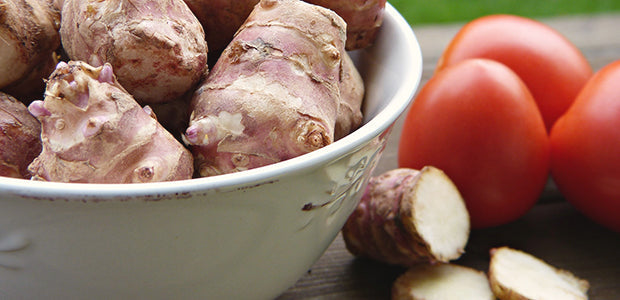THE Jerusalem artichoke, or "Jerusalem Artichoke" in English, is a perennial plant part of our ancestral diet. It is found in the majority of the wild fields of Quebec, as well as in several gardens. As it is a very invasive plant, several gardeners remove it from the ground, ignoring its culinary properties making it a superb extra charge. The tuber (big root) having the appearance of a small carrot, however has many health benefits.
Jerusalem artichoke: the plant
Jerusalem artichoke is a perennial plant of the sunflower family up to 1 to 3 meters in height. At the end of its long stem garnished with green leaves stands a yellow flower reminiscent of the pace of a daisy. Its root (tuber), whose shape resembles that of ginger, is the edible part of the plant, like any root vegetable. It is in these long bulbs that the strong interesting properties of the plant are found.

The Jerusalem artichoke: its benefits
The Jeromatmobour bulb stores its sugars in inulin and not starch, which distinguishes it from its root vegetable cousins. Inulin, a type of food fiber, has many health benefits, making Jerusalem artichokes a vegetable of choice to consume.
Benefits on the intestines: As inulin is not digested in the small intestine, this fiber goes to the big intestine. This is where it can feed good bacteria and by the same fact, contribute to the reduction of bad bacteria. This is the prebiotic action of Jerusalem artichoke. In addition, inulin can remedy constipation by increasing the volume, density and frequency of stool. To achieve this effect, daily consumption of 3 tablespoons with a Jerusalem artichoke table may be enough.
Benefits for diabetes : Inulin has been widely studied for its effects on diabetes, especially on blood sugar (concentration of blood sugar). According to clinical studies, inulin stabilizes blood sugar and can help prevent and reverse type 2 diabetes markers.
Healthy health benefits: The fibers contained in the Jerusalem artichoke facilitates weight loss by reducing signs of hunger while stimulating satiety.
Benefits on cholesterol levels: Dietary fibers, in particular inulin, contribute to the reduction of bad cholesterol and triglycerides.
Bone benefits: The sugars contained in the Jerusaleman help the body to absorb certain minerals, including calcium and magnesium. This has the effect of improving bone density while reducing the risk of osteoporosis.
Benefits on cancer protection : Regular consumption of Jerusalem artichoke promotes the development of an intestinal flora with anti-cancer effects. Inulin has been particularly studied for its protective effect against colon and breast cancer.
The Jerusalem artichoke: its preparation
The Jerusalem artichoke is delicious in all its forms. Raw as cooked, this is a good source of iron and potassium.
Raw preparation: The Amerindians have mainly consumed raw Jerusalem artichoke. As is, it has a slight hazelnut taste and a pleasant crunchy texture. In salad, grated or thin slices, it replaces the celery-radi. Jerusalem artichoke is often used in the manufacture of raw juice, especially in duet with apples. Quickly not changing the taste of the juice, it cuts the amount of sugar from the final product.
Cooked preparation: Cooked, the Jerusalem artichoke has a texture similar to that of the potato. Jerusalem artichoke can therefore replace the potato in several dishes, including soups, soups and staples. Grilled in the oven, it is delicious, in cubes or in sticks, brushed in olive oil and enhanced with herbs.
Have you ever tried the prebiotic bread Inswa Montreal bakery? Each slice of bread has 4 g of inulin (coming from the Jerusalem artichoke). For more information on Jerusalem artichokes and their benefits, come and see us atLa Boite à Grains. Our healthy advisers will be happy to help you. In addition, we have local Jerusalem artichokes all the month of October!


